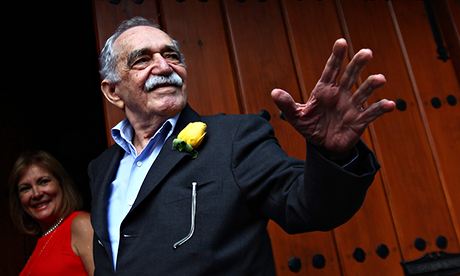
Gabriel García Márquez greets journalists and neighbours outside his house in Mexico City earlier this year. Photograph: Edgard Garrido/Reuters
Sometime in the very early 1970s two Australian friends returned from Colombia and asked me to ghostwrite the story of their adventures, which included a conversation with an unknown writer named Gabriel García Márquez. In an effort to overcome my reluctance they lent me an English edition of One Hundred Years of Solitude. None of us understood that they had thereby changed my life.
I tried, and failed, to help them memorialise their adventure. Worse, I "forgot" to return the book. Worse still, I arrogantly decided that this novel by this unknown writer would be of far more use to me than it could ever be to them.
I was, at the time I became a thief, stumbling to find a way to escape what Patrick White had called "the dun-coloured realism" of my own country's literature, to make the windswept paddocks on the Geelong Road, say, become luminous and new. The stories worked well enough, but I still wasn't up to the bigger challenge. The absence of placenames in the stories is a good indication of what I was avoiding, a sign that I was still too young (and damaged) to see that Myrniong was a beautiful strange name and that Wonthaggi was a poem unto itself.
It would take 10 years (some 20 stories and a novel) to free myself of this colonial bind, but the first step, without a doubt, was when I opened One Hundred Years of Solitude and read: "At that time Macondo was a village of 20 adobe houses built on the bank of a river of clear water that ran along a bed of polished stones, which were white and enormous, like prehistoric eggs. The world was so recent that many things lacked names, and in order to indicate them it was necessary to point."
Thus Márquez threw open the door I had been so feebly scratching on.
In truth he had done it before that: "Many years later, as he faced the firing squad, Colonel Aureliano Buendía was to remember that distant afternoon when his father took him to discover ice."
More
I tried, and failed, to help them memorialise their adventure. Worse, I "forgot" to return the book. Worse still, I arrogantly decided that this novel by this unknown writer would be of far more use to me than it could ever be to them.
I was, at the time I became a thief, stumbling to find a way to escape what Patrick White had called "the dun-coloured realism" of my own country's literature, to make the windswept paddocks on the Geelong Road, say, become luminous and new. The stories worked well enough, but I still wasn't up to the bigger challenge. The absence of placenames in the stories is a good indication of what I was avoiding, a sign that I was still too young (and damaged) to see that Myrniong was a beautiful strange name and that Wonthaggi was a poem unto itself.
It would take 10 years (some 20 stories and a novel) to free myself of this colonial bind, but the first step, without a doubt, was when I opened One Hundred Years of Solitude and read: "At that time Macondo was a village of 20 adobe houses built on the bank of a river of clear water that ran along a bed of polished stones, which were white and enormous, like prehistoric eggs. The world was so recent that many things lacked names, and in order to indicate them it was necessary to point."
Thus Márquez threw open the door I had been so feebly scratching on.
In truth he had done it before that: "Many years later, as he faced the firing squad, Colonel Aureliano Buendía was to remember that distant afternoon when his father took him to discover ice."
More
No comments:
Post a Comment